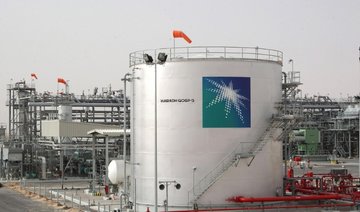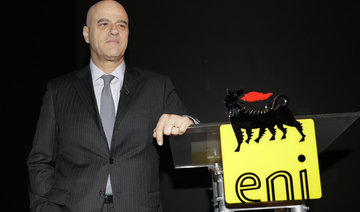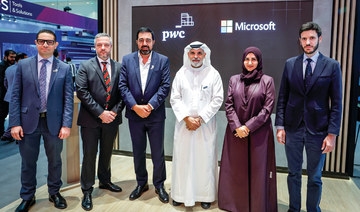SINGAPORE: Royal Dutch Shell is close to bagging a deal to supply Hong Kong with liquefied natural gas (LNG), beating out major competitors for the right to be the first company to supply LNG to the city.
Shell has edged out companies such as Malaysia’s Petronas to supply LNG through a long-term contract to Hong Kong utility CLP Power, two sources familiar with the matter told Reuters.
Hong Kong is undertaking a massive shift to using more natural gas to fuel its electric power generation from coal, potentially creating a steady and lucrative demand source in the Asian LNG market.
Under the deal, Shell will supply about 1.2 million tons per annum (mtpa) of LNG for about 10 years starting after 2020, the sources said, declining to be named as they were not authorized to speak to the media.
However, the supply agreement will be subject to a final investment decision (FID) for an offshore LNG import terminal that will include a floating storage and regasification unit (FSRU), one of the sources said.
It was not immediately clear if the deal was binding or a memorandum of understanding.
CLP and Petronas did not immediately reply to requests for comment. Shell declined to comment on the specific deal and said it “continuously seeks opportunities to grow and improve profitability.”
“This may include talking with third parties from time to time, any conversations are confidential,” a spokeswoman said.
As part of its commitment to the Paris Climate Change Agreement, Hong Kong is aiming to increase the use of natural gas in its total fuel mix for power generation to about 50 percent by 2020 from 22 percent as of 2012.
Hong Kong currently produces power using imported fuel in domestic power plants or from imported natural gas from the mainland. The country’s coal-fired plants will reach the end of their useful life in the next decade.
Hong Kong’s gas demand is expected to grow after 2020 as a result of efforts to meet environmental targets, said Edmund Siau, an LNG analyst with consultancy FGE.
“A mixture of LNG imports and increased pipeline gas imports from China will likely help to meet this demand growth,” he said.
CLP Power is building a new gas-fired generation unit at its Black Point Power station at a cost of HK$5.5 billion ($701.42 million) which will start operations by 2020, according to the company’s 2017 annual report.
It is also planning to develop an offshore import terminal using the FSRU that will be located in the southern waters of Hong Kong, according to the report.
CLP is now undertaking an environmental impact assessment of the Hong Kong Offshore LNG Terminal project, which involves the FSRU, said a spokeswoman from the country’s Environmental Protection Department.
Apart from CLP Power, privately-owned Hong Kong Electric Company is also looking to import LNG, a source familiar with the matter said. Hong Kong Electric did not immediately respond to an email seeking comment.
In 2008, CLP scrapped a $1-billion LNG plant after China signed an agreement with Hong Kong to guarantee a steady supply of energy to the city for a further 20 years.
Shell close to clinching Hong Kong’s first LNG import deal
Shell close to clinching Hong Kong’s first LNG import deal

Middle East IPO market set for continued growth in 2024: PwC report

RIYADH: Initial public offerings in the Middle East are poised for continued positive aftermarket performance this year, following significant post-IPO gains in the first quarter, a new report stated.
PwC’s latest IPO+ Watch report highlighted the Saudi Stock Exchange’s emergence as a dominant force in Gulf Cooperation Council equity market launches activity, hosting the majority during the quarter, underscoring the region’s attractiveness to investors seeking dynamic opportunities.
“Tadawul is reported to remain the most active exchange in the GCC with all but one IPOs taking place on either Tadawul main market or the Nomu parallel market,” the report stated.
On the primary market, three IPOs garnered a combined total of $667 million, while on the secondary market, six offerings raised $57 million in total.
Notable among the recent successes are MBC Group Co. and Avalon Pharma, both witnessing substantial market gains.
However, the report noted that the market’s attention has been captured by the demand for Dubai Parking, which set a new record for subscription levels at the Dubai Financial Market, being oversubscribed by 165 times.
The offerings landscape in the Middle East during the first three months of this year was characterized by activity across various sectors, showcasing a diverse range of investment opportunities.
From consumer markets with companies like Parkin Co. and Modern Mills for Food Products Co., to health industries represented by Avalon Pharma, and technology, media, and telecommunications with MBC Group Co., the IPO wave has touched multiple sectors.
Additionally, smaller-scale market debuts were observed in the financial services, industrials, manufacturing, and automobile sectors.
Muhammad Hassan, capital markets leader at PwC Middle East, expressed optimism, citing Parkin’s oversubscription and double-digit post-IPO gains as indicators of sustained positive momentum.
“We expect the privatization agenda across the GCC, combined with the ambition of private family businesses to go public, will continue to drive issuance supporting positive momentum in GCC IPO activity in 2024,” he added.
Looking ahead, the report anticipated continued strength in the public flotation landscape for the remainder of 2024, buoyed by a robust pipeline.
Private sector companies seeking liquidity and access to capital are expected to drive much of this activity, with Saudi Arabia and the UAE leading the charge. Nevertheless, there’s growing momentum in markets like Oman and Qatar, signaling a broader regional expansion of IPO activity.
Qatar Investment Authority commits to supporting France’s semiconductor sector

RIYADH: Qatar will venture into France’s tech industry as a major investment body announced its intent to anchor a financial commitment in Ardian Semiconductor.
This move marks the Qatar Investment Authority’s participation in a pioneering thematic fund designed to enhance the semiconductor industry in Europe. It highlights its role as a preferred financial partner in key technology subsectors, including supply chain developments.
QIA’s strategic focus on this sector reflects its belief in the critical role semiconductors play in driving digital and green transformations across vital industries such as artificial intelligence, mobility, and consumer technology, according to an official release.
This initiative is part of QIA’s broader investment strategy to engage with leading businesses at the forefront of innovation.
Notably, QIA’s interest in the semiconductor value chain includes a recent minority stake in Japan’s Kokusai Electric Corp., a leader in semiconductor manufacturing, taken in June 2023, underscoring its ongoing commitment to significant investments in this area globally.
Furthermore, on May 13, QIA announced its plan to significantly expand its investment partnership with Bpifrance by as much as €300 million ($323 million), reinforcing their joint commitment to stimulating economic growth and innovation in France.
This enhancement marks a pivotal development in their collaboration, initially established through the Future French Champions joint venture.
The first phase of this partnership, concluded in 2021, effectively channeled almost €300 million into supporting job creation, economic development, and particularly bolstering the French small and medium-sized enterprises sector.
Building on these achievements, both entities progressed to the second phase of their collaboration in January 2023, committing an additional €300 million.
They now plan to embark on a third phase, pledging up to another €300 million once the current funds are fully deployed.
The renewed partnership will focus on strategic priorities such as artificial intelligence, semiconductors, quantum computing, healthcare, aerospace, and energy transition.
These investments are intended to advance technological capabilities, enhance competitiveness across various sectors, and promote sustainable growth, reflecting both parties’ commitment to driving significant innovations and supporting France’s long-term economic objectives.
OPEC sticks to oil demand view, sees improvement in global economy

RIYADH: The Organization of The Petroleum Exporting Countries stuck to its forecast for relatively strong growth in global oil demand in 2024 on Tuesday and said there was a chance the world economy could do better than expected this year.
In its monthly report, OPEC said world oil demand will rise by 2.25 million barrels per day in 2024 and by 1.85 million bpd in 2025. Both forecasts were unchanged from last month.
Demand for members of the Organization of Economic Co-operation and Development is projected to expand by nearly 0.3 million bpd, while the non-OECD is forecast to grow by about 2 million bpd.
This is the last report before OPEC and its allies, known as OPEC+, meet on June 1 to finalize output policy. The oil alliance, in its report, sounded an upbeat tone on the economic outlook.
“Despite certain downside risks, the continued momentum observed since the start of the year could create additional upside potential for global economic growth in 2024 and beyond,” OPEC said.
The world economic growth forecasts for 2024 and 2025 remain unchanged at 2.8 percent and 2.9 per, respectively.
The report slightly revised up the US growth forecast for 2024 and 2025 to 2.2 percent and 1.9 percent respectively.
“The economic growth forecast for the eurozone remains at 0.5 percent for 2024 and 1.2 percent for 2025,” it added.
It kept China’s economic growth forecast at 4.8 percent in 2024 and 4.6 percent in 2025. Russia’s economic growth for 2024 is revised up slightly to 2.3 percent, while the forecast for 2025 remains at 1.4 percent.
According to the report, refinery margins in April continued to trend downward as the recovery in refinery processing rates and stronger product output weighed on product markets.
ITFC’s new initiative promises to boost economic and trade growth in Central Asia

RIYADH: Economic and regional integration among the six Organization of Islamic Cooperation member countries is set to grow with a new program from the International Islamic Trade Finance Corp.
The Trade Connect Central Asia+ Program, also known as TCCA+, was launched recently by ITFC, a member of the Islamic Development Bank Group, during the third Tashkent International Investment Forum. It is poised to enhance economic growth in Kazakhstan, Kyrgyzstan, and Tajikistan, as well as Turkmenistan, Uzbekistan, and Azerbaijan.
The region, which boasts one of the world’s largest energy resources and significant production capacities in energy and agriculture, currently lacks the trade markets needed to harness its full potential, according to a press release.
In a statement at the launch, Hani Sonbol, CEO of ITFC, said: “We are immensely proud to launch the TCCA+ Program, which represents a significant step forward in enhancing economic cooperation and boosting trade across the Central Asia region and beyond.”
He stated that this initiative is designed to unlock the vast economic potential of the region by facilitating increased regional trade and investment.
“With a focus on the energy and agriculture sectors, we are committed to fostering sustainable economic growth and regional integration that benefits all member countries involved,” added Sonbol.
Focused on boosting regional trade and expanding the export base toward higher value-added products, the TCCA+ Program is anticipated to foster inclusive and sustainable economic growth, alongside promoting regional economic integration among the six targeted countries, the release added.
Qiddiya Investment Co. incorporates SEVEN to advance Saudi entertainment industry

RIYADH: Leisure firm Saudi Entertainment Ventures is set to be incorporated into Qiddiya Investment Co., an affiliate of the Kingdom’s sovereign wealth fund.
The integration of the firm, also known as SEVEN – another subsidiary of the Public Investment Fund – into QIC will strengthen the objectives of advancing the entertainment concept, nurturing local talents and capabilities, and improving the quality of life across the Kingdom, the Saudi Press Agency reported.
SEVEN aims to revolutionize leisure nationwide by enhancing visitor experiences through the development and operation of 21 entertainment destinations across 14 cities in the Kingdom, with investments surpassing SR50 billion ($13.3 billion).
Abdullah Al-Dawood, managing director of QIC and chairman of SEVEN, underscored the significance of the entertainment firm’s integration into QIC. He emphasized that this move supports their ability to foster a culture of playfulness and joy among all members of society, including citizens, residents, and visitors, thus contributing positively to societal well-being.
“The step also aims to nurture knowledge, skills, and creativity among individuals, ultimately targeting to create a new concept of fun and improving quality of life through the development of an integrated and unprecedented entertainment system, capable of contributing significantly to the Kingdom’s economic diversification plan,” Al-Dawood added.















